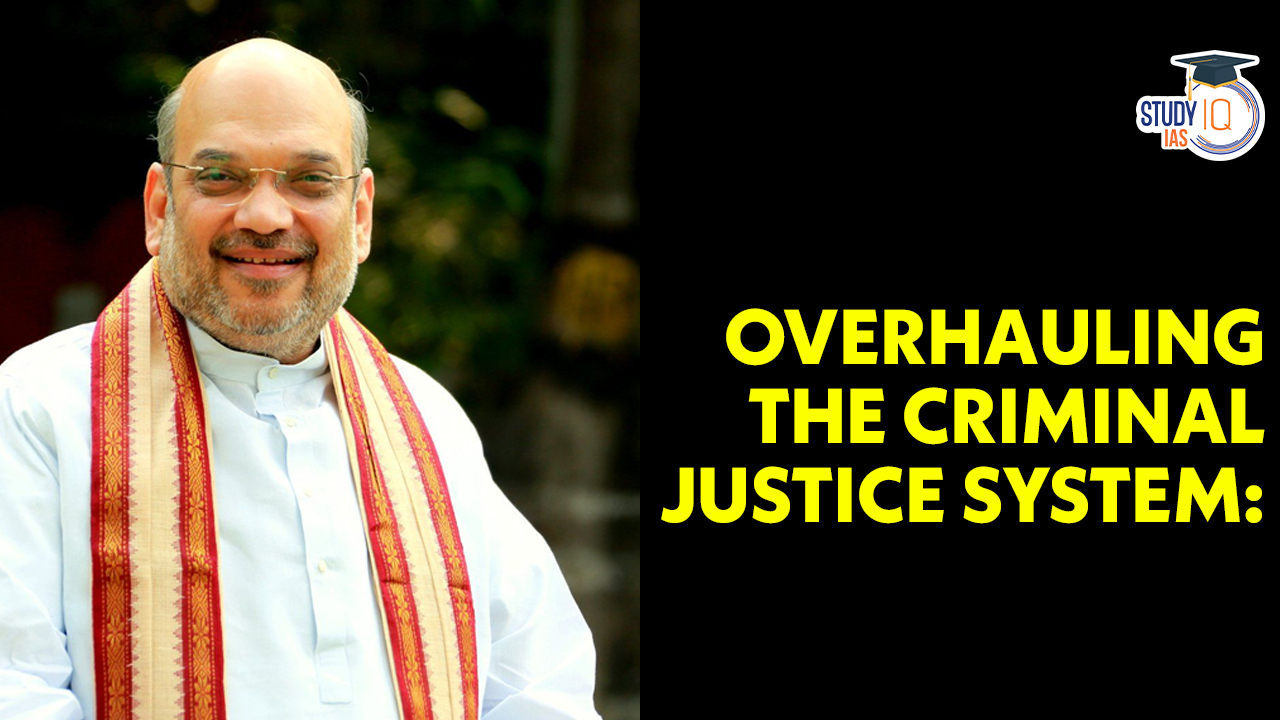Table of Contents
Context: The Union Home Minister introduced three new bills in the Lok Sabha to revamp India’s criminal laws.
More on News
- The Indian Evidence Act, Code of Criminal Procedure (CrPC) and the Indian Penal Code (IPC) will be replaced by the Bharatiya Sakshya Bill, 2023; Bharatiya Nagarik Suraksha Sanhita, 2023; and Bharatiya Nyaya Sanhita 2023 respectively.

Objectives of the Bills
- The Bharatiya Nyaya Sanhita (BNS) Bill introduces new categories of offences, such as cybercrimes, terrorism, hate crimes, honour crimes, mob lynching, etc. It provides special provisions for women, children, senior citizens, and other vulnerable sections of society.
- The Bharatiya Nagarik Suraksha Sanhita (BNSS) Bill seeks to ensure the protection of the rights and interests of the victims, witnesses and accused persons in the criminal justice process. It provides for speedy and fair trials, effective investigation and prosecution, alternative dispute resolution mechanisms, victim compensation and rehabilitation schemes, witness protection programmes, etc.
- The Bharatiya Sakshya (BS) Bill provides for scientific and technological advancements in evidence collection and analysis, such as DNA testing, narco-analysis, brain mapping, etc. It lays down guidelines for admissibility and relevancy of evidence, burden and standard of proof, a presumption of innocence and guilt, etc.
Need for the Bill
- The need for reforming the criminal justice system in India has been felt for a long time.
- The current laws are based on the colonial legacy and do not reflect the contemporary realities and aspirations of Indian society.
- The laws are also outdated, complex, and ambiguous, leading to delays, inefficiencies, and injustices in the delivery of justice.
- Moreover, the laws are not in sync with the constitutional values and principles of India, such as equality, dignity, secularism, and human rights. Therefore, there has been a demand from various quarters, including the judiciary, the legal fraternity, civil society, and the public, to revamp the criminal justice system in India.
- Therefore these bills are based on the Indian ethos and culture. The bills also aim to simplify, rationalize, and modernize the criminal justice system in India.
Code of Criminal Procedure (CrPC)
- The Bharatiya Nagarik Suraksha Sanhita Bill 2023 seeks to replace the CrPC.
- Enacted in 1973 (came into force on 1 April 1974), CrPC is the main legislation on procedure for administration of substantive criminal law in India.
- It provides –
- The machinery for the investigation of crime
- Apprehension of suspected criminals
- Collection of evidence
- Determination of guilt or innocence of the accused person and
- The determination of punishment of the guilty
- It also deals with public nuisance, prevention of offences and maintenance of wife, child and parents.
Important Changes proposed in the CrPC
- Greater use of technology:
- Trials, appeal proceedings, recording of depositions including those of public servants and police officers, may be held in electronic mode.
- The statement of the accused too can be recorded through video-conferencing.
- Summons, warrants, documents, police reports, statements of evidence can be done in electronic form.
- Communication devices:
- The Bill adds electronic communication including “communication devices”.
- On the directions of a court or police officer, a person is required to produce any document/ device that is likely to contain digital evidence for the purpose of an inquiry.
- Use of handcuffs: A police officer may be permitted to use handcuffs while arresting a person if he is a repeat offender who escaped from custody, or has committed an organised crime, terrorist act, offences against the state, etc.
- Specific safeguards:
- Section 41A of CrPC – which has a prominent safeguard against arrests – will get a new number, Section 35.
- It has an additional provision: no person can be arrested without prior permission of an officer, not below the rank of a DSP, in cases where the offence is punishable with less than 3 years, or if the person is above 60 years of age.
- Mercy petitions:
- There is a provision on procedures for the timeframe to file mercy petitions in death sentence cases.
- After being informed by jail authorities about the disposal of the petition of a convict sentenced to death, he, or his legal heir or relative can submit a mercy petition within 30 days to the Governor.
- If rejected, the person can petition the President within 60 days. No appeal against the order of the President shall lie in any court.
- Sanction to prosecute:
- A decision to grant or reject sanction to prosecute a public servant must be reached by the government within 120 days of receiving a request.
- If the government fails to do so, the sanction will be deemed to have been accorded.
- No sanction is required in cases including sexual offences, trafficking, etc.
- Arms in procession:
- Section 144A of the CrPC gives the district magistrate the power to prohibit the carrying of arms in any procession, mass drill or mass training, to preserve the public peace.
- While the provisions granting powers to the DM remain as they are in Section 144 of the CrPC, the provision to prohibit carrying arms does not find a mention.
- Samples without arrest: The Bill has provisions for the magistrate to order any person to give samples of his signature, handwriting, voice or finger impressions for the purpose of investigation without being arrested.
- Detention by police: There are provisions for police to detain or remove any person resisting, refusing or ignoring, or disregarding directions given as part of preventive action.
- A trial in absentia: It is prescribed in stringent anti-terror legislation such as the Unlawful Activities (Prevention) Act (UAPA) where an alternative criminal law framework applies.
- In such laws, the burden of proof is reversed – with the onus on the accused to prove himself not guilty rather than the state carrying the duty to prove guilt against the accused.
Significance of the Bharatiya Nagarik Suraksha Sanhita Bill
- It will consolidate and amend the law relating to criminal procedure and calls for specific timelines for time-bound investigations, trials and judgements.
- It will ensure speedy delivery of justice.
- The draft legislation falls in line with the government’s Digital India initiative.
- For example, it provides for admissibility of digital or electronic record as evidence, which shall have the same legal validity and enforceability as a paper record.
- The legislation adopts a citizen centric approach for supply of a FIR and informs victims about the progress of the case, including by digital means.
- Summary trial has been proposed for petty offences. A ‘Zero FIR’ can be lodged at any police station and the FIR must be transferred within 15 days to the police station having jurisdiction over the place of crime.


 Assam Police Constable Cut off 2025
Assam Police Constable Cut off 2025
 National Supercomputing Mission (NSM)
National Supercomputing Mission (NSM)
 Asola Bhati Wildlife Sanctuary, Location...
Asola Bhati Wildlife Sanctuary, Location...





















